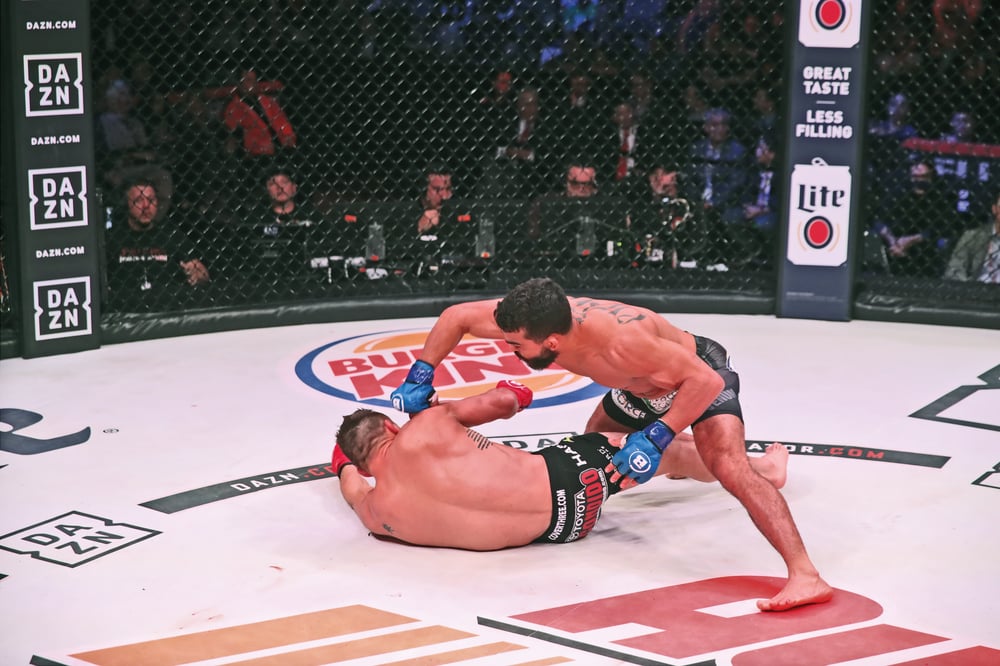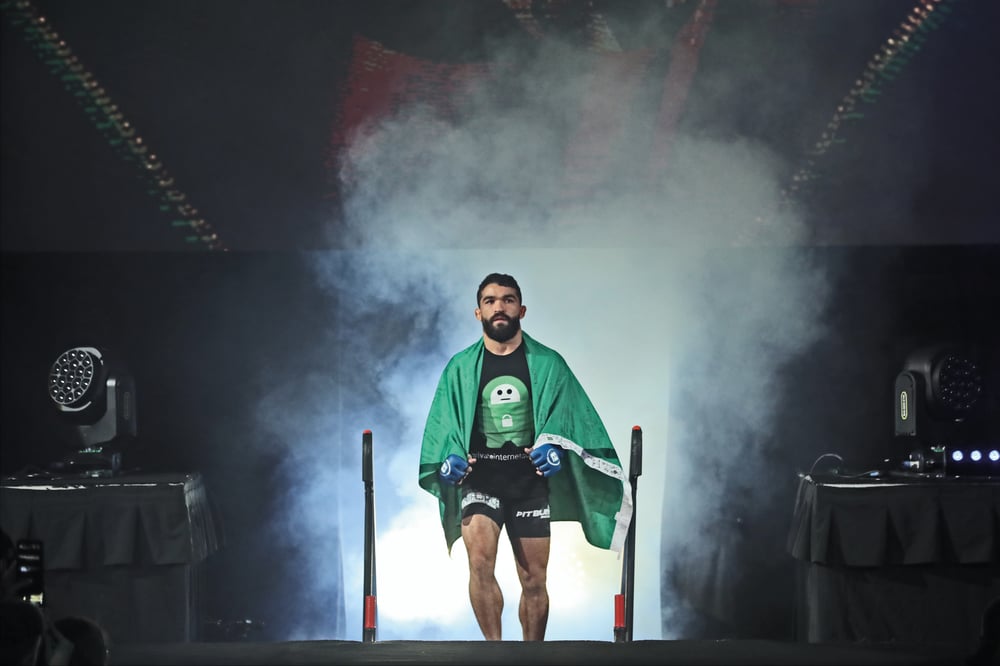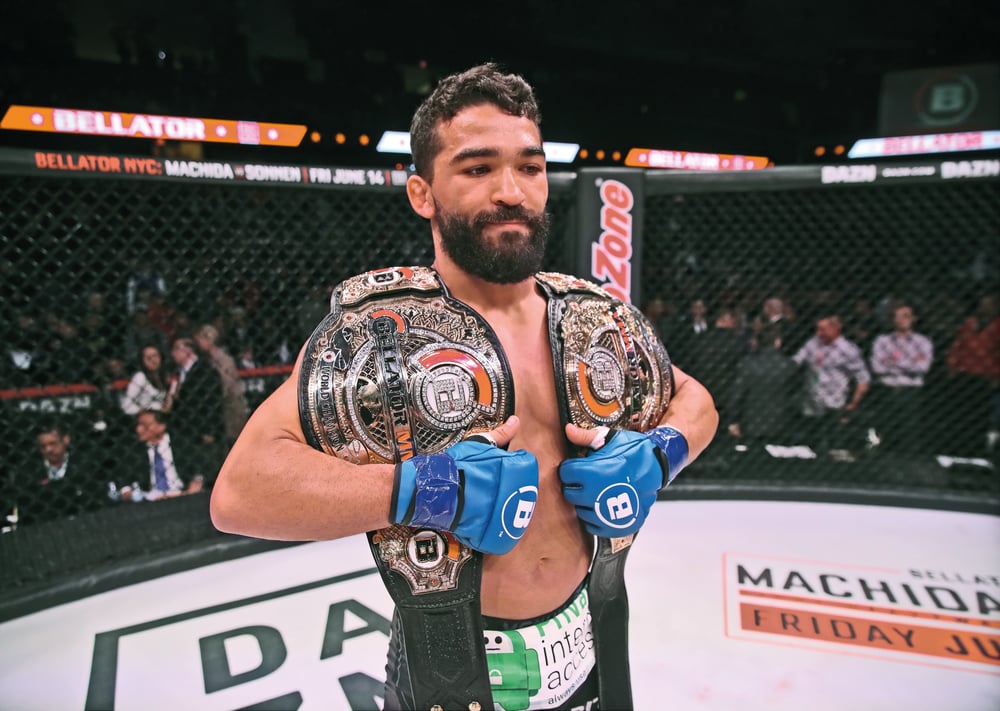
Issue 190
May 2020
The Pitbull Brothers – Patricio and Patricky Freire – have been tearing into top MMA fighters for over a decade. And as Patricio tells Fighters Only, they won’t rest until they’re both champions.
As masterful as he is menacing, Patricio Pitbull is one half of that duo of Brazilian brothers who have earned their stripes in the sport of mixed martial arts, with the Bellator fight league having become their breeding ground for success. If you want loyalty, get a Pitbull brother, you might say. Patricio has become a double champion at featherweight and lightweight in Bellator yet he would always say that it is not just down to him, given the unbreakable bond with his brother Patricky, who fights in the lightweight division. But they have certainly become a brand as the ‘Pitbull Brothers’.
They are inseparable, but it is Patricio, 18 months younger than Patricky, who has become an accomplished championship fighter in the last two years, having claimed the first gold dockets for the family – birth name Freire – to put in the trophy cabinet at home. It might have been the individual who claimed the belts, but the success is a collective.
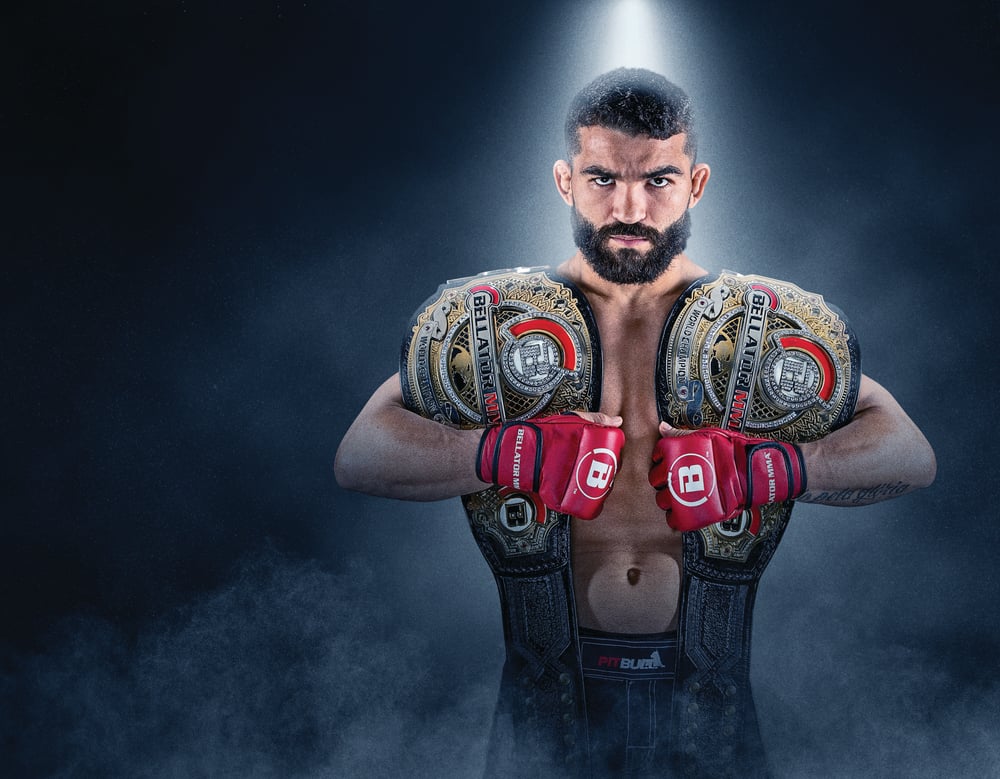
As sibling rivalry goes, the two Brazilian fighters have had each other’s backs since they raised themselves to their feet as little boys in their hometown of Natal, and started to swing their arms and feet against the world from the day they took to the mats at five and six years old respectively. And that even includes against each other.
They are called the Pitbulls for a reason. When they fight, they are relentless. When an opponent is announced as facing them, they are hyper-focused on them, and ready for a war. But they are so close. Patricio could not have achieved his goals without his brother. And that connection they have is tangible when you are around them. So much is unsaid. But it is there in the body language. They have been sparring partners for each other, both cohorts and bellowing cornermen, and even confidants and the tightest of allies. Forever. In other words, an extraordinary fighting friendship brought about by their blood ties, and, we might even add, their lust for the fight sport industry. It is a calling.
“Since we were infants me and my brother were fighting ten times a day,” explains Patricio. “We are like the Diaz brothers, but more violent.” That has carried on into adulthood. Once upset, once offended, once made a rival, they refuse to relent. When they had a feud with fighter Will Brooks, a few years ago, Bellator took the decision to house them in different hotels to their opponents during fight week. Brooks claimed he was attacked by them in fight week. They are volatile and emotionally charged. Just like Pitbulls, of course.
“Everyone knows I’m a person with a very short fuse and emotions run high with me,” explains Patricio. “But once I get into the cage, it’s all gone. You saw that when I fought Michael Chandler. He was talking shit for three years. He beat my brother twice and when it was all said and done, I was cold as ice and I finished him in one minute. I can’t tell you for sure what will happen when I meet people I have a rivalry with, who trash talk me, but inside the cage I will be cold and I will finish that guy.
“I have to fight like a Pitbull,” he continues. “There is no stopping when that bell rings. I did not create this style. It is me. It is in my heart.”
And this is said with absolute conviction.
None of this has come overnight for champ-champ Patricio. For the record, he has been with the Bellator organization for just over a decade, with 23 fights in that time, and has produced a consistency as solid as anyone, anywhere in the sport. Like all great champions, moreover, the 32-year-old has won, lost and then regained the title, the mark of a true winner.
Indeed, Pitbull’s four losses in his 34-fight career have been to featherweight champions Joe Warren, Pat Curran and Daniel Straus, and at lightweight, to Benson Henderson. For a long time, Patricio was clearly underrated. But not anymore.
“Every guy who fights me says they’re better than me and they’re going to do this and that, and they end up failing,” he laughs. “It’ll be more of the same time and again. At this level, all the opponents have great skills, they bring a big level of violence that is very effective. These are always the factors, and because of that, I take all of my opponents seriously. You have to...”
Does Pitbull feel that there has been a lack of recognition widely in the sport for his achievements, particularly after his victory over Chandler last year to become a two-weight world champion?
“I think most of the time people, or fans in the main, only go by where you fight,” he replies. “There are so many UFC fighters who are overrated and fighters outside the UFC are generally underestimated. That will change though as the sport develops and as all organizations grow...”
Over the years, your correspondent has had several interviews with Patricio. There was a moment in Rome in 2018, when he was defending the Bellator featherweight title against Daniel Weichel in a terrific split-decision five-round war, outdoors in the searing heat. I had the privilege of speaking to him after he had just visited the Colosseum and the ancient city of Rome, an inspiring monument to a culture now long gone, yet where, in the ruins, lie ghosts and feelings that do assemble as you walk around it, and soak up the history. Pitbull enthused to me about being a modern-day gladiator as he prepared for the event.
Like other fighters involved that night, Patricio had felt the ancient spirits, and a kinship with the gladiators who had once lived there and fought for their livelihood – and lives – in the great circular structure in the heart of the modern Italian capital.
“Fighting in Rome brings history in my mind, these ancient warriors that once fought here. I know how Bellator see this show in Rome. It was a special historical fight, and the fighters on the card got to see the Colosseum, visit the ancient places, and to me it’s something that will never leave my mind.”
Pitbull clearly believes that modern MMA fighters, had they been around then, would have been gladiators.
“I think a lot of fighters would have been, yes of course,” he mused. “But I would not have wanted to be a slave, fighting for my freedom. I like to be free. Rome has a special meaning to me and I feel very honored to be fighting here.”
It certainly inspired Pitbull to victory that night, in what proved a special, fistic encounter with his German rival, who never took a backward step.
They no longer spar, the brothers Pitbull. We move on to the rivalry that was always around Patricio, growing up. They were so competitive with one another. So much so that they had to stop at one point. And that was it. Never again.
“We hurt each other too much in sparring, “ he explains. “The last time we sparred was in Rio and the boxing coach made us stop because were going too hard, too crazy. The round was over for ten seconds and we kept punching each other. When you look back, as kids, we got in a lot of fights. Every day at school, at college and at home. For us it was normal. Everything ended in a fight. But not today, no more.”
In childhood, he explains, they seemed destined to be fighters, growing up in Natal. Patricio reasons that fighting chose them, as a calling, with their parents playing a part in that in a large way through their characters, and professions. Patricio reckons he gets his lively nature from his mother.
“That instinct I get for fighting is from my mum and her dad. Marlusa, our mum, is fiery. Our father, Lucilio, is calm. He was a firefighter and a cop. He was very athletic, he boxed, he did arm-wrestling, weight-lifting, everything. My father wanted to be a boxer but he grew up in a little town and they didn’t have anything available to him.
“But we – me and Patricky – were always fighting as kids,” he continues. “If my dad gave us two cups of juice and there was one-ounce difference we’d fight over it. If he bought us shorts with different colors and one of us liked the other color, we’d fight. We were 10 and 11 when we first started jiu-jitsu. Every day I’d beat him in the training and he’d beat me in the training. We were very competitive.”
That translated to the gym, too.
“After practice, we’d stay on the mat and call other partners to come and train with us,” he recalls. “We were the last ones to leave. We wanted everybody to stay for more after the 90-minute practice. We did it all day. There wasn’t too much downtime in between fights. We’d fight, make up, fight, make up. Even if we were fighting, and we’d just finished fighting, and they were playing soccer and somebody messed with one of us, we’d have a fight. Even if we had had a fight and had fallen out, we’d fight for each other.”
“As we got older, when we were adolescents, the fights between us got more serious. We got stronger, we were learning martial arts techniques. It was getting serious and painful. We had a brawl one day and didn’t speak for almost a year, even though we were sharing a bedroom.”
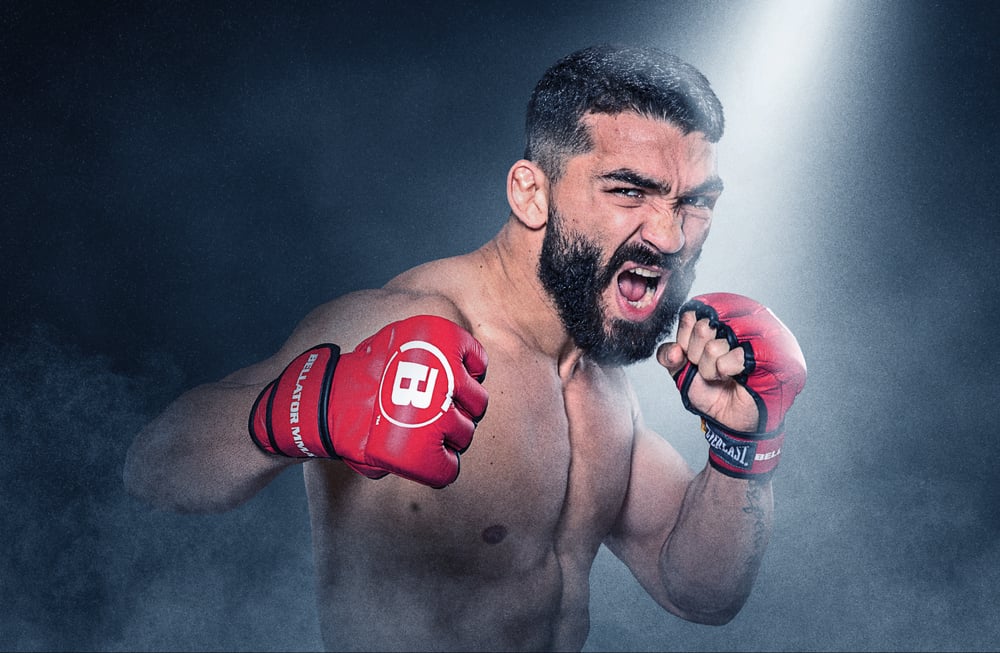
It’s no wonder they no longer spar. But they are rarely apart in life, or training. They both have their own families and children now, but are rarely apart.
Brazilian legends also feature in Patricio’s development. Like Wanderlei Silva. He will always be an instrumental figure in his life. Patricio was bullied when he first went to the gym to train seriously.
“I have an old memory of Wanderlei of when I was two or three months into training at Chute Box,” Patricio told Fighters Only. “I don’t even know if he remembers. The training at Chute Box was very tiring. They had me fighting several different guys until I was very exhausted. And then they would start putting fresh guys in there, one after another. They wanted to fuck me up. There were like 40 guys around the mat cheering for whoever came in against me. I know Wanderlei was there and he didn’t like what was going on and he didn’t agree with it. He started cheering for me. Out of the forty guys he was the only guy who was cheering me and was against what they were trying to do. I will never forget that. It showed me something about him.”
Camps at Chute Box were always brutal, but it sharpened Patricio. It was tough then, but he appreciates it now. It was old school.
“It dates back to how MMA was at the time. Training was intense, training like that would help guys come out of their shell. Ultimately I didn’t spend much time at Chute Box after that but it was an experience that added to my character as a fighter.”
We come to the present day, and the resonance of Patricio and his success at home. MMA has flourished in Brazil, and Bellator fighters from that country have risen to the top, given the success, notably, of Patricio and the emergence, latterly, of Douglas Lima, as one of the very best of the best in the welterweight division. Indeed, there are some who believe Lima could be the very best at 170lbs. More recently, another legend, Cris Cyborg claimed the Bellator women’s featherweight crown.
There is also a conveyor belt of stars who have made it in the UFC, Strikeforce, Invicta and the WEC, from Anderson Silva to Vitor Belfort to Jose Also. We discuss the peaks and troughs of interest in Brazil of late, but Patricio thinks the overall standing of the sport in his country – which, after all, is one of the great cradles for the sport – has grown and now has a strong foothold. His own presence would be augmented, moreover, if Patricky can also win a Bellator title.
They could never fight each other, of course. But he explained: “I’m at the top right now. But my brother is coming, too. Mark my words, he’s going to be a world champion too. I believe that. We’ve never had it in the history of MMA, two brothers as champions. But it will happen.”
Brazil’s fans, he added, can be as critical as they can be adoring. “When you’re winning they’re applauding you and when you’re losing they’re throwing stones at you,” he muses. “I want my fans to be close to me because I want them to be my friends and my family. I don’t pay attention to what the view of the rest of the country is....”
But this fighter certainly deserves the love, as he gives everything with every step inside the cage. “There was a time back in Brazil when the fighters weren’t respected as much. Now our fighters are getting recognized as they should be, and we’re able to sustain ourselves and support families through the money we’re earning. Now we’re idols. Back in the day the fighters were even seen as bums. Now it has become more mainstream, there is the opportunity to become a legend.”
Pitbull is certainly well on the way to that status. Perhaps it will take crossover fights to do that.
“I don’t think I get anywhere near the credit I deserve,” he explains. “But with time I think MMA will get through this period to when champions from different promotions can fight each other, like boxing. That’s when those things can really be decided and I’ll get my time to shine. We have to see champion fight champion between organizations. I think it’s a natural step for MMA. I hope I’m still here when it happens. We need to see the best fighting each other to show the world who really is the best.”
And there is no doubt at all that Patricio Pitbull belongs right in there with the very best. Period.
...

